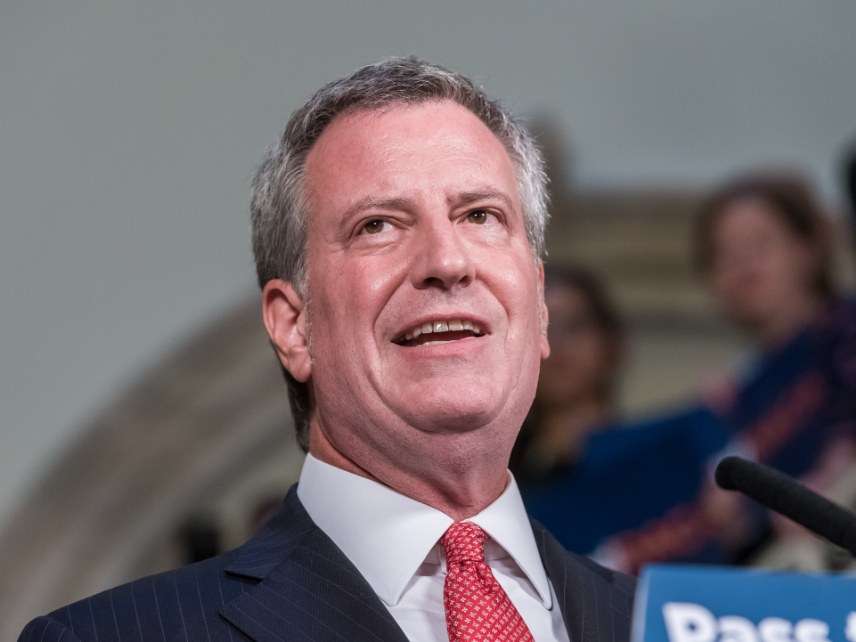New York Mayor to Property Owners: Drop Dead
De Blasio literally wants to tell people what to do with their land.

It shouldn't come as surprise that New York Mayor Bill de Blasio, who campaigned on fighting income inequality and wants to tax the rich to pay for public transit improvements, has a fairly dim view of private property rights. But "dim" is apparently a bit of an understatement. De Blasio flat out does not believe in the right to private property.
That's highlighted in its starkest terms in a New York piece out this week. Here is de Blasio's response when asked about efforts to fight income inequality:
What's been hardest is the way our legal system is structured to favor private property. I think people all over this city, of every background, would like to have the city government be able to determine which building goes where, how high it will be, who gets to live in it, what the rent will be. I think there's a socialistic impulse, which I hear every day, in every kind of community, that they would like things to be planned in accordance to their needs. And I would, too. Unfortunately, what stands in the way of that is hundreds of years of history that have elevated property rights and wealth to the point that that's the reality that calls the tune on a lot of development….
Look, if I had my druthers, the city government would determine every single plot of land, how development would proceed. And there would be very stringent requirements around income levels and rents. That's a world I'd love to see, and I think what we have, in this city at least, are people who would love to have the New Deal back, on one level. They'd love to have a very, very powerful government, including a federal government, involved in directly addressing their day-to-day reality.
Reason editor Katherine Mangu-Ward called de Blasio a perfect Ayn Rand villain for good cause, people!
There are no doubt a number of people in urban environments who want exactly what de Blasio says. But what they really want is to control what other people do with their property, to make them match their vision of what their community should look like. And since no two people actually agree on what every single piece of property should look like, the decision-making role would actually fall to the government and de Blasio. That is clearly what he wants: He tries to sell it by invoking the "needs" of the "community," but government officials ultimately get to decide what those needs are and how to meet them.
How does that work out in real life? Terribly, of course! Government officials are no more pure of heart than those wealthy property owners. In fact, they are often the wealthiest of property owners. When government takes control of property development, it's the poor and downtrodden who very frequently take it on the chin. Government control over property inherently creates a dynamic where the most influential and powerful constituencies decide what happens. It's a recipe for collusion between government and developers, and also for NIMBY behavior that keeps the poor from having access to housing and cheap retail and services.
When government doesn't respect private property, you get situations like the one in Pleasant Hill in Charlestown, Indiana. There the mayor stands accused of colluding with developers to drive working-class citizens and retirees out of their homes so that the properties can be razed to build something bigger. The town has reportedly abused the code enforcement rules to saddle these people with fines and essentially force them to sell their homes. Imagine if the mayor could just decide to boot all these people out because he wants to build something bigger and better. That's the society De Blasio is openly calling for.
Or come on over here to California, where wealthy homeowners abuse environmental regulations to stop more housing from being built. Basically, they're using the government's control over development to keep "undesirable" people—read: poor people or minorities—out of their neighborhoods. And they're not afraid to vote against politicians who don't cooperate. An environment where elected officials have control over property development is an environment that favors entrenched, established interests. It certainly would not help de Blasio's alleged fight against income inequality.
Unsurprisingly, cities like New York and Los Angeles—the ones with the tightest controls on property development—are the ones that struggle to build affordable housing. The problem isn't property rights; it's rules that drive up the cost of building homes. Why would anybody build for low-income people if regulations make it impossible to do so and still make money?
For a look at the real explanations why New York has a housing crisis, check out real estate attorney Joshua Stein's article in the upcoming November issue of Reason, which will start hitting the stands next week. Spoiler: Mindsets like de Blasio's are the cause of the problem, not the solution.


Show Comments (98)